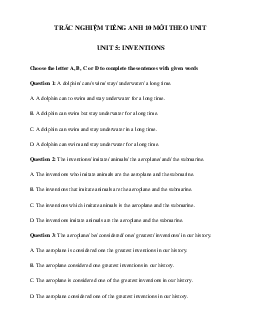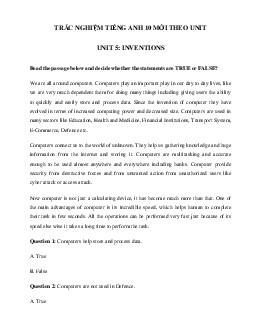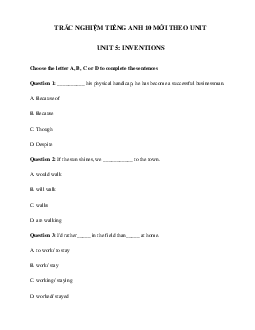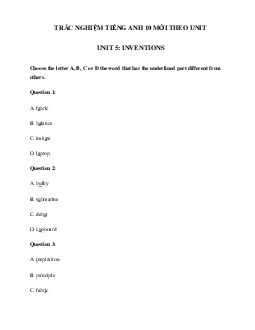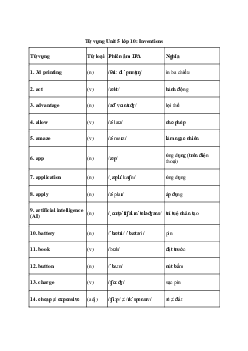








Preview text:
UNIT 5: INVENTION I. PHONETICS
1. Put these words into the correct column. Pay attention to the stress. Then pronoun the words exactly. blackboard black board whiteboard white board greenhouse green house software soft ware tallboy tall boy O o o O II. VOCABULARY
1. Look at the picture and write the word under each picture. 1. 2. 3. 4. 5. 6. 7. 8. 9. 10. 11. 12.
2. Make a phrase with each of the words in 1. 1. laptop: 2. smartphone: 3. ebook reader: 4. usb stick: 5. aeroplane: 6. submarine: 7. spacesuit: 8. printer: Trang 1 9. chopsticks: 10. digital camera: 11. instant noodles: 12. dolphin: III. GRAMMAR I.
Put the verbs into the suitable form, the present perfect or the present perfect progressive. 1. A: How long (you/ study) English? B: I
(learn) English since I was twelve.
2. A: Are you waiting for someone? B: Yes, I
(wait) for two hours, but my friend (not come) yet. 3. A: I (lose) my address book. (you/ see) it anywhere? B: Yes. I
(just/ see) it on the bookshelf. 4. A: You look tired. (you/ work) so hard? B: Yes. I
(study) for four hours and probably won‟t finish until midnight. 5. A: (you/ see) Mark recently? B: No, I
(not/ see) him since Christmas, I wonder where he (live) since then. 6. A: I feel really tired. B: It‟s because you (do) too much. A: Well, at least I
(finish) that report now, and I can relax. 7. A: Someone
(leave) the ladder outside, look. B: I expect that‟s Mike. He
(clean) the windows. I don‟t think he (finish) yet.
8. A: You‟ve got mud on your shoes.
B: It‟s all right, I‟ll take them off. I (work) in the garden.
A: Yes, it looks a lot tidier. Well done. You (do) a good job. 9. A: I
(hear) that you and Harriet are building a garage. How long (you/ do) that?
B: Oh, for about a month now. We (do) about half of it
10. A: You‟re still reading that book, aren‟t you? How long (you/ read) it? B: I
(read) it for three days, but I (not/ finish) it yet
II. Put the verbs in brackets in the correct form: past simple or present perfect. 1. I
(have) this shirt for nearly four years. 2. Joanna
(tidy) her desk, but now it‟s in a mess again. 3. Mike
(lose) his key. He can‟t find it anywhere. 4. The last time I
(go) to Brighton was in August. 5. I (finish) my homework. I (do) it before tea.
6. And the race is over! And Micky Simpson (win) in a record time! 7. Martin
(be) to Greek five times. He loves the place.
8. Of course I can ride a bike. But I (not/ ride) one for years.
9. I don‟t know. Carol‟s husband. I (never/ meet) him. 10. Rupert (leave) a message for you. He (ring) last night.
11. Your car looks very clean. (you/ wash) it? Trang 2 12. We (move) here in 1993. We (be) here a long time now. 13. Mr Clack
(work) in a bank for 15 years. Then he gave it up.
14. Is this the first time you (cook) pasta? 15. I
(work) for a computer company since I (graduate) from university. 16. We
(post) the parcel three weeks ago. If you still (not/ receive). 17. Albert Einstein (be) the scientist who (develop) the theory of relativity. 18. My grandfather (die) 30 years ago. I (never/ meet) him.
19. A: Is your father at home? B: No, I‟m afraid he (go) out. A: When exactly (he/ go) out? B: About ten minutes ago. 20. A: Where do you live? B: Boston. A: How long (you/live) there? B: 5 years. A: Where (you/live) before that? B: Chicago. B: 2 years.
III. Read this letter to a newspaper. Then look at the answer below and write the correct answer in each space. A few days ago I (1)
that someone planned to knock down the White Horse Inn. This pub (2)
the center of village life for centuries. It (3) at our crossroads for 500 years. It (4)
famous in the old days, and Shakespeare once (5) there, they say. I (6)
in Brickfield all my life. The villager (7) about the
plans for less than a week and already there‟s a „Save Our Pub‟ campaign. Last week we (8) happy, but this week we (9) angry. We (10) them, you‟ll see. 1. a. had learned b. learned c. has learned d. learn 2. a. has been b. had been c. was d. is 3. a. stood b. is standing c. stands d. has stood 4. a. has been b. is c. was d. had been 5. a. had stayed b. stayed c. stays d. has stayed 6. a. lived b. am living c. was d. have lived 7. a. have known b. knew c. had known d. know 8. a. are being b. has been c. were d. had been 9. a. are b. were c. has been d. are being 10. a. are stopping b. will stop c. stop d. are going to stop
IV. Change the phrase from past simple to present perfect and vice versa.
1. This is the first time he went abroad.
→ He hasn‟t ......................................................................................................................
2. She started driving 1 month ago.
→ She has .........................................................................................................................
3. We began eating when it started to rain.
→ We have .......................................................................................................................
4. I last had my hair cut when I left her. Trang 3
→ I haven‟t .......................................................................................................................
5. The last time she kissed me was 5 months ago.
→ She hasn‟t .....................................................................................................................
6. It is a long time since we last met.
→ We haven‟t ................................................................................................................... 7. When did you have it ?
→ How long ......................................................................................................................
8. This is the first time I had such a delicious meal.
→ I haven‟t .......................................................................................................................
V. Choose the best answer. 1. When the school? A. have you joined B. did you joined C. did you join D. have you ever joined 2. in England? A. Did you ever worked B. Have you ever worked C. Worked you D. Didn't you have worked 3. That's the best speech . A. I never heard B. I didn't hear C. I used to hear D. I've ever heard
4. He's the most difficult housemate . A. I never dealt with. B. I never had to deal with.
C. I've ever had to deal with.
D. I've never had to deal with 5. to him last week. A. I spoke B. I've already spoken C. I didn't spoke D. I speaked 6.
a contract last year and it is still valid. A. We have signed B. We signed C. We haven't signed D. We have sign 7.
from a business trip to France. A. I come back B. I came back C. I never came back D. I've just come back 8. Prices in 1995 but then in 1996. A. rised – failed B. rose - fell C. have risen - have fallen D. rose - have fallen 9. You to a word . A. listened - I haven't said B. didn't listen -I say C. listened - saying
D. haven't listened - I've said 10. I can't believe that the news. A. you haven't read B. you didn't read C. you don't read D. you read not
VI. Complete the following description with to - infinitive or V-ing.
1. This knife is used to (cut) bread.
2. Facebook is used for (communicate) among the young.
3. The manual is used for (give) instruction to new users. 4. My computer is used (play) music and video. Trang 4
5. My teacher often uses a ruler to (draw) lines.
6. I use a smart phone to (send) and (receive) emails.
7. This tablet is mainly used for (read) electronic book.
8. We can use this USB (store) information.
9. These tables are used for (study) .
10. My father uses a calculator to (calculate) . IV. READING
1. Read the passage and answer the question.
Inventor Thomas Alva Edison
Inventor Thomas Alva Edison was born on February 11,1847, in Milan, Ohio. He was the
last of the seven children of Samuel and Nancy Edison. Thomas's father was an exiled
political activist from Canada. His mother, an accomplished school teacher, was a major
influence in Thomas‟ early life. An early bout with scarlet fever as well as ear infections left
him with hearing difficulties in both ears, a malady that would eventually leave him nearly
deaf as an adult. Edison would later recount as an adult, with variations on the story, that he
lost his hearing due to a train accident where his ears were injured. But others have tended to
discount this as the sole cause of his hearing loss.
In 1854, the family moved to Port Huron, Michigan, where Edison attended public school for
a total of 12 weeks. A hyperactive child, prone to distraction, he was deemed "difficult" by his
teacher. His mother quickly pulled him from school and taught him at home. At age 11, he
showed a voracious appetite for knowledge, reading books on a wide range of subjects. In this
wide-open curriculum Edison developed a process for self-education and learning independently
that would serve him throughout his life.
1. When and where was Edison was born?
2. Who had the most important influence on his life?
3. Why did he loss his earing?
4. How long did he study at school?
5. How did the teacher evaluate him?
6. What character served him throughout his life?
2. Read the passage and complete the gaps.
LOUIS BRAILLE (1809 -1852)
Louis Braille was the son of a French leather worker. He (1) blind at the age of
three when he fell on a tool in his father‟ workshop. But Louis was a (2) and
talented boy. He wanted to be a musician, so he learned to play the cello, and at the age of ten he (3)
a scholarship to The National Institute for Blind Children in Paris. He could play the cello, (4) he could not read or write.
In 1819 a French soldier, Charles Barbier, (5)
“night writing”. He used patterns
of twelve raised dots on paper so that soldiers could read (6) the dark. Louis
Braille understood the importance of this invention for blind people and (7) he was
fifteen, he began to develop it. He made it (8)
, with six dots, not twelve. In
1829 he introduced it at the Institute. Trang 5 By 1932 “Braille” was (9)
all over the world in many languages, but unfortunately
Louis died of tuberculosis in 1852 and never (10)
of the importance of his invention. 1. A. came B. went C. reached D. got 2. A. brave B. courage C. able D. possible 3. A. defeated B. beat C. became D. won 4. A. so B. and C. but D. however 5. A. invented B. discovered C. found out D. set up 6. A. under B. in C. with D. of 7. A. then B. while C. at D. when 8. A. simply B. simpler C. more simple D. more simply 9. A. for use B. for using C. in use D. in usage 10. A. understood B. knew C. aware D. saw V. SPEAKING
1. Computer is a very famous invention in the world. It has lot of advantage but it also has
some disadvantages. Can you list some of advantages and disadvantages of computer. ADVANTAGES DISADVANTAGES
- .............................................................
- .............................................................
- .............................................................
- .............................................................
- .............................................................
- .............................................................
- .............................................................
- .............................................................
- .............................................................
- .............................................................
2. Make a short talk about advantages and disadvantage of computer. Report your
answer in oral speech and record your talk. VI. WRITING
1. What are the benefits of a tablet or a smartphone? For communication: For entertainment: For information: For learning: Etc
2. Write a short paragraph about the benefits of a tablet or a smartphone. Use the ideas in
1 to support your answer. Trang 6 ĐÁP ÁN Unit 5: INVENTION I. PHONETICS
1. Put these words into the correct column. Pay attention to the stress. Then pronoun the words exactly. O o o O blackboard black board whiteboard white board greenhouse green house software software tallboy tallboy II. VOCABULARY
1. Look at the picture and write the word under each picture. 1. laptop 2. smartphone 3. ebook reader 4. usb stick 5. aeroplane 6. submarine 7. spacesuit 8. printer 9. chopsticks 10. digital camera 11. instant noodles 12. dolphin
2. Make a phrase with each of the words in 1.
1. laptop: My father just bought me a laptop.
2. smart phone: I use this smartphone to send and receive emails.
3. ebook reader: This ebook reader is cheap and convenient.
4. usb stick: My father like using USB stick to store information.
5. aeroplane: Aeroplane is a very important invention of people.
6. submarine: Thanks to submarine we can discover the sea more easily.
7. spacesuit: The astronaut needs a good spacesuit.
8. printer: There is something wrong with this printer. It can‟t print any more.
9. chopsticks: Chopsticks are useful to pick up food.
10. digital camera: This camera is very modern.
11. instant noodles: We eat instant noodles every day.
12. dolphin: Dolphin is friendly and intelligent. III. GRAMMAR I.
Put the verbs into the suitable form, the present perfect or the present perfect progressive.
1. have you been studying – have been learning
2. have been waiting - hasn‟t come
3. have lost - Have you seen - have just seen
4. Have you been working - have been studying
5. Have you seen - haven‟t seen - has lived/ has been living
6. have been doing - have finished
7. has left - has been cleaning - has finished
8. have been working - have done
9. have heard - have you been doing - have done
10. have you been reading - have been reading - haven‟t finished Trang 7
II. Put the verbs in brackets in the correct form: past simple or present perfect. 1. have had 11. Have you washed 2. tidied 12. moved - have been 3. has lost 13. worked 4. went 14. have cooked 5. have finished – did 15. have worked - graduated 6. has won 16. posted - haven't received 7. has been 17. was - developed 8. haven‟t ridden 18. died - never met 9. have never met 19. has gone - did he go 10. has left-rang
20. have you lived - did you live
III. Read this letter to a newspaper. Then look at the answer below and write the correct answer in each space. l. b 2. a 3. d 4. c 5. b 6. d 7. a 8. c 9. a 10. b
IV. Change the phrase from past simple to present perfect and vice versa.
1. He hasn‟t gone abroad before.
2. She has started driving for one month.
3. We have just started eating when it rained.
4. I haven‟t had my hair cut since I left her.
5. She hasn‟t kissed me for five months.
6. We haven‟t met for a long time. 7. How long have you had it?
8. I haven‟t had such a delicious meal before.
V. Choose the best answer. 1. C 2. B 3. D 4. C 5. A 6. B 7. D 8. B 9. D 10. A
VI. Complete the following description with to - infinitive or V-ing. 1. to cut 6. send, receive 2. communicate 7. read 3. give 8. store 4. play 9. study 5. draw 10. calculate IV. READING
1. Read the passage and answer the question.
1. He was born on February 11, 1847, in Milan, Ohio. 2. His mother did.
3. He lost his hearing due to a train accident where his ears were injured.
4. He studied there for 12 weeks.
5. The teacher deemed that he was “difficult” (his learning ability is bad). 6. Self-education did.
2. Read the passage and complete the gaps. l. B 2. D 3. D 4. C 5. A 6. B 7. D 8. D 9. C 10. B V. SPEAKING Trang 8
1. Computer is a very famous invention in the world. It has lot of advantage but it also has
some disadvantages. Can you list some of advantages and disadvantages of computer.
Suggested answer (Câu trả lời gợi ý) ADVANTAGES DISADVANTAGES
Entertaining: watching movies, listening to
Wastage of time: many people play games
gongs, playing computer games. and chat for so long time.
Working: banks provide online banking
Health‟s risk: sitting in front of computer
screen for so long has bad effects on eyes and back.
Studying: students learn foreign language
Data security: the data stored on a computer more effectively
can be accessed by unauthorized persons through networks.
Working: people can type documents, which Impact on environment: the wasted parts of
make the documents easy to look at and computer can release dangerous toxic organized.
materials which harm the environment.
Entertaining: social websites provide chance
Computer crimes: people can steal important
for people to make friends all over the world.
data from big organizations or personal information of individuals.
2. Make a short talk about advantages and disadvantage of computer. Report your
answer in oral speech and record your talk.
Student’s answer (Học sinh tự trả lời) VI. WRITING
1. What are the benefits of a tablet or a smartphone?
For communication: make phone calls, send and receive messages, contact with anyone through social websites
For entertainment: read books, listen to music, watch videos, play games
For information: read online newspaper, surf the Internet, use maps to look for places
For learning: record your voice, listen to lessons tape, take photograph of a book page or a, lesson
Useful tool: alarm clock, calculator, weather forecast, map direction etc
2. Write a short paragraph about the benefits of a tablet or a smartphone. Use the ideas in
1 to support your answer.
Nowadays smartphone is not something weird to many people. It is one of the most
useful technology devices that not only adults such as businessmen but also students at
school or college use very much. With a smartphone we can do many things. Firstly, like any
other phones, we can use smartphone for communication purpose such as making phone calls
or sending text message. Secondly, we also use smartphone to entertaining activities such as
playing games or listening to music. Moreover, smartphone can also be used to get
information about what is happening around the world if you surf the webs. Furthermore,
students can use smartphone to record and listen to their lessons, or they can record their
voice when they study foreign language. In addition to these benefits, it‟s a very useful tool
for you. It can be an alarm clock, a calculator, a weather forecast and an excellent direction
www.thuvienhoclieu.com Trang 9
